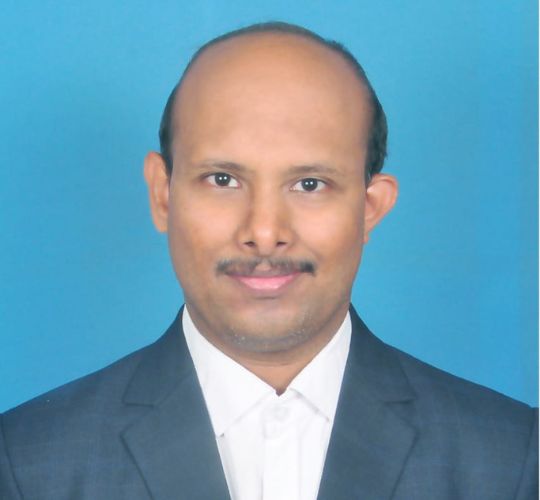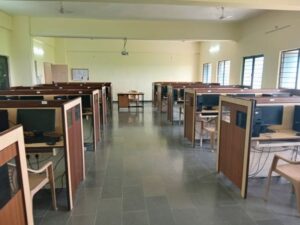Information Technology
[seopress_breadcrumbs]
Welcome to Information Technology
Highlights of the Department
- Well qualified and experienced faculty in diversified domains.
- Nine computer centers with state-of-the-art-facilities.
- An Exclusive Department Library.
Programs Offered
- B.Tech (IT)
Intake – 90
About Department
- The department of IT was established in 2022 with an intake of 90 students in the UG Programme. Right from its inception it is continuously striving to impart quality education and competitive spirit among students for academic excellence.
- The department is equipped with state of the art computing facilities and experienced staff members and is known for its academic excellence proved by its performances since its inception. The Department also has audio-visual facilities with LCD Projectors and Digital Boards and Seminar Hall for effective teaching. The staff members are deputed to participate in workshops, Conferences and refreshers courses to keep in place with recent developments in the field of IT.
Vision
To impart quality technical education, conduct scientific research of excellence and generate world class professionals to excel in the dynamic realm of Information Technology and contribute to the needs of the society.
Mission
The Information Technology Department is committed
- To achieve excellence in higher education and research through dissemination of quality technical education with a strong foundation.
- To continuously scout for and build opportunities in the field of IT and sustain long-term interaction with the institute and industry.
- To build and uphold high professional and ethical standards to make the nation noted for its progressive contribution to global society.
Long Term Goals
- To encourage research activities in the department.
To establish centre-of-excellence for research in computer Science. - To establish and strengthen Industry-Institute interaction and be industry solution providers.
- To take up sponsored projects from private and government organizations.
- To have more number of publications and patents in the emerging areas of Computer Science.
- To create better entrepreneurs in the area of IT.
Short Term Goals
- To strengthen the department infrastructure and human resources.
- To conduct faculty development programmes regularly for skill up gradation.
- To conduct programmes for students to acquire soft and hard skills and inculcate leadership qualities, research orientation and technical skills.
- To conduct continuing education programs and workshops/ conferences for knowledge sharing with the outside world.
- To improve academic performance of students using innovative and creative methods of teaching.
Quality Policy
To ensure high standards in imparting professional education by providing world-class infrastructure, top-quality-faculty and decent work culture to sculpt the students into Socially Responsible Professionals through creative team-work, innovation and research.
Faculty
Staff
Head of the Department

Mr. K. Vijay Kumar
M.Tech (Ph.D)
Mr. K. Vijay Kumar passed B.Tech in Information Technology from Jawaharlal Nehru Technological University, Hyderabad in 2006 and M.Tech in Software Engineering from Jawaharlal Nehru Technological University, Hyderabad in 2010.
He is pursuing Ph.D in KLU, Vijayawada. He is the member of CSI, CSTA. His research interest is mainly in Data Science, Machine Learning, Data Mining, He guided a number of real time projects in PG and UG level. He also organized number of workshops, conference and seminars.
Infrastructure
Information Communication Technology (ICT) has the potential to transform the nature and process of teaching and learning environment / culture. Interactivity, flexibility, and convenience in an ICT supported environment enable both teachers and students to access and share ideas and information in diverse communication styles and formats. Class rooms are equipped with smart boards & LCD projectors to enhance ICT enabled teaching and learning.
Benefits with ICT enabled teaching:
- Improves student-teacher collaboration and interaction
- Encourages teachers to teach in real-time with audio and video lessons, visual multimedia & PPT presentations, 2D & 3D virtual space, etc.
- Paperless advantages
- Enhances Real-time blended teaching and learning methods
- Creates Web and Internet-based teaching and learning platform for teacher and students respectively
- Facilitates mobile integration facility.
- The implementation of ICT in OBE can effectively accomplish the goals of quality education which is a process that reduces consumption of resources and increases learning outcomes.
The entire campus is Wi-Fi enabled with high speed internet connection to allow the students to access the internet no-matter wherever they are. The coverage is not just limited to the classrooms; instead it extends to all the facilities within the campus premises. Staff and Students can utilize the Wi-Fi Facility by registering their devices for the active usage of the facility.
Laboratories
Compiler Design Lab
Course Outcomes:
Upon the successful completion of this course, the student will be able to:
- Design, develop, and implement a compiler for any language.
- Use lex tools for developing a scanner .
- Understand the type checking storage allocation strategies
- Design and implement LL and LR parsers.
- Use yacc tools for developing a parser
Data Mining Lab
Course Outcomes:
Upon the successful completion of this course, the student will be able to:
- Apply preprocessing statistical methods for any given raw data.
- Gain practical experience of constructing a data warehouse.
- Implement various algorithms for data mining in order to discover interesting patterns from large amounts of data.
- Apply OLAP operations on data cube construction
- To analyze the process of preprocessing the data
Data Structure Lab
Course Outcomes:
Upon the successful completion of this course, the student will be able to:
- Ability to develop C programs for computing and real-life applications using basic elements like control statements, functions, pointers and structures and various linked lists.
- Ability to develop data structures like stacks and queues using arrays and pointers.
- Ability to implements the sorting methods like Quick sort, Heap sort and Merge sort.
- Ability to implement various trees and tree traversal techniques in recursive and non-recursive manner.
- Gain knowledge on implementing the graph traversal techniques and Pattern matching algorithms like Boyer- Moore, Knuth-Morris-Pratt
DBMS Lab
Course Outcomes:
Upon the successful completion of this course, the student will be able to:
- Develop ER data model and Relational data model for a database.
- Design database schema for a given application and apply normalization.
- Apply SQL commands for data definition and data manipulation.
- Apply the basics of SQL for retrieval and management of data.
- Develop solutions for database applications using procedures, cursors, and triggers.
Full Stack Development Lab
Course Outcomes:
Upon the successful completion of this course, the student will be able to:
- Design flexible and responsive Web applications using Node JS, React, Express, and Angular.
- Perform CRUD operations with MongoDB on huge amounts of data.
- Develop real-time applications using React components.
- Use various full stack modules to handle HTTP requests and responses.
IT Workshop
Course Outcomes:
Upon the successful completion of this course, the student will be able to:
- Perform hardware troubleshooting.
- Understand hardware components and interdependencies.
- Safeguard computer systems from viruses/worms.
- Document/presentation preparation.
- Perform calculations using spreadsheets.
Java Programming Lab
Course Outcomes:
Upon the successful completion of this course, the student will be able to:
- Able to write programs for solving real-world problems using Java OOP principles.
- Able to write programs using Exception Handling approach.
- Able to write programs using Java Collection Framework.
- Able to write multithreaded applications.
- Able to write GUI programs using Swing controls in Java.
Machine Learning Lab

Course Outcomes:
Upon the successful completion of this course, the student will be able to:
- Understand modern notions in predictive data analysis.
- Select data, model selection, model complexity, and identify the trends.
- Understand a range of machine learning algorithms along with their strengths and weaknesses.
- Build predictive models from data and analyze their performance.
- Understand the performance analysis of classification algorithms.
Mobile Application Development Lab
Course Outcomes:
Upon the successful completion of this course, the student will be able to:
- Develop applications in an Android environment.
- Develop user interface applications.
- Develop URL-related applications.
- Develop text-related applications.
- Develop database-related applications.
Operating System Lab
Course Outcomes:
Upon the successful completion of this course, the student will be able to:
- Simulate and implement operating system concepts such as scheduling.
- Able to implement C programs using Unix system calls.
- Implement deadlock avoidance using the Banker’s algorithm.
- Implement the Producer and Consumer problem and Page Replacement algorithms.
- Exercise inter-process communication.
PPS Lab
Course Outcomes:
Course Outcomes:
Upon the successful completion of this course, the student will be able to:
- Apply fundamental programming concepts and exercise control statements to solve simple problems.
- Represent and manipulate data with arrays and strings.
- Modularize the code with functions so that they can be reused.
- Develop applications using user-defined data types.
- Implement various searching and sorting techniques.
Python Lab
Course Outcomes:
Upon the successful completion of this course, the student will be able to:
- Able to develop programs using control statements.
- Able to code programs using a modular approach.
- Read and write data from/to files in Python programs.
- Write a GUI program to create a window wizard using various buttons.
- Implement digital systems using Python and install and use various libraries.
Scripting Language Lab
Course Outcomes:
Upon the successful completion of this course, the student will be able to:
- Understand the basic concepts of Ruby.
- Understand the concepts of Ruby for developing web-based projects.
- Understand the basic concepts of TCL.
- Understand the concepts of TCL for working with files.
- Understand the applications of Perl scripting language.
SE & CN Lab
Course Outcomes:
Upon the successful completion of this course, the student will be able to:
- Ability to translate end-user requirements into system and software requirements.
- Ability to generate a high-level design of the system from the software requirements.
- Implement data link layer framing methods.
- Analyze error detection and error correction codes.
- Implement and analyze routing and congestion issues in network design.
Software Testing Methodology Lab
Course Outcomes:
Upon the successful completion of this course, the student will be able to:
- Design and develop the best test strategies in accordance with the development model.
- Design and develop GUI, Bitmap, and database checkpoints.
- Develop database checkpoints for different checks.
- Perform batch testing with and without parameter passing.
- Perform Silent mode test execution without any interruption.
Contact Us
Head of the Department
9553122276
hod.inf@anurag.ac.in

